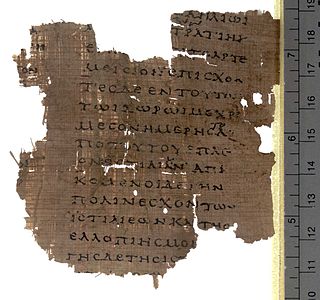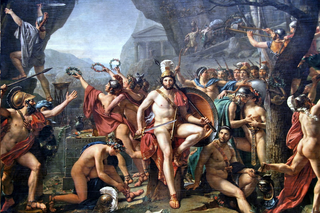Related Research Articles

Leonidas I was king of the Ancient Greek city-state of Sparta. He was the son of king Anaxandridas II and the 17th king of the Agiad dynasty, a Spartan royal house which claimed descent from the mythical demigod Heracles. Leonidas I ascended to the throne in c. 489 BC, succeeding his half-brother king Cleomenes I. He ruled jointly along with king Leotychidas until his death in 480 BC, when he was succeeded by his son, Pleistarchus.
Cleomenes I was Agiad King of Sparta from c. 524 to c. 490 BC. One of the most important Spartan kings, Cleomenes was instrumental in organising the Greek resistance against the Persian Empire of Darius, as well as shaping the geopolitical balance of Classical Greece.

Pausanias was a Spartan regent and a general. In 479 BC, as a leader of the Hellenic League's combined land forces, he won a pivotal victory against the Achaemenid Empire in the Battle of Plataea. Despite his role in ending the Second Persian invasion of Greece, Pausanias subsequently fell under suspicion of conspiring with the Persian king Xerxes I. After an interval of repeated arrests and debates about his guilt, he was starved to death by his fellow Spartans. What is known of his life is largely according to Thucydides' History of the Peloponnesian War, Diodorus' Bibliotheca historica and a handful of other classical sources.

Tegea was a settlement in ancient Arcadia, and it is also a former municipality in Arcadia, Peloponnese, Greece. Since the 2011 local government reform it is part of the Tripoli municipality, of which it is a municipal unit with an area of 118.350 km2. It is near the modern villages of Alea and Episkopi.

The Histories of Herodotus is considered the founding work of history in Western literature. Although not a fully impartial record, it remains one of the West's most important sources regarding these affairs. Moreover, it established the genre and study of history in the Western world.

Demaratus was a king of Sparta from around 515 BC to 491 BC. He was the 15th ruler of the Eurypontid dynasty and the firstborn son of King Ariston. During his reign, Demaratus is best known for his opposition to his co-ruler, King Cleomenes I of the Agiad dynasty. This rivalry ultimately led to his dethronement around 491 BC, following Cleomenes' accusations of illegitimacy and political maneuvering.

Chilon of Sparta was a Spartan politician credited with the militarization of Spartan society, and one of the Seven Sages of Greece.
Agis I was a king of Sparta and eponym of the Agiad dynasty. He was possibly the first historical king of Sparta, reigning at the end of the tenth century BC, during the emergence of the Dorians in Laconia. He is said by most ancient authors to have conquered the region and enslaved the helots.
Pleistarchus was the Agiad King of Sparta from 480 to 458 BC.
Anaxandridas II was an Agiad king of Sparta from c. 560 BC to 524 BC, father of Leonidas I and grandfather of Pleistarchus. Under the leadership of the ephor Chilon, in office during the middle of the 6th century, Sparta ended its streak of violent conquests, such as in Messenia, and adopted a pro-Achaea policy based on diplomacy. Anaxandridas was succeeded by Cleomenes I.
Anaxidamus was a king of Sparta, 11th of the Eurypontids.

Leon was the 14th Agiad dynasty King of Sparta, ruling from 590 BC to 560 BC.
Eurycratides was the thirteenth king of Sparta from the Agiad dynasty. He succeeded his father Anaxander around 615 BC and reigned during a devastating period of war with Tegea.
Gorgo was a Spartan woman and wife to King Leonidas I. She was the daughter and the only known child of Cleomenes I, Leonidas' half-brother and King of Sparta. Gorgo was also the mother of King Pleistarchus, her only son with King Leonidas I. She is notably one of the few female historical figures actually named by Herodotus, and is depicted in sources as intelligent and wise. Her birth date is uncertain, but based on Herodotus' dating, it is most likely to have been between 518 and 508 BC.
Eurycrates was the 11th Agiad dynasty king of the Greek city-state of Sparta, who was preceded by his father Polydorus followed by his son Anaxander. He ruled from 665 to 640 BC.
Alcmenes or Alcamenes, Alkamenos, was the 9th king of Sparta of the Agiad dynasty, from c. 740 to c. 700 BC.

The Agiad dynasty was one of the two royal families of the Ancient Greek city-state of Sparta. They ruled jointly along with the Eurypontid dynasty, possibly from the 8th century BC onwards, being the senior of the two houses. The hypothetical founder of the dynasty was Agis I, possibly the first king of Sparta at the end of the 10th century BC, who subsequently gave his name to the dynasty. The two lines, who maintained an enduring rivalry, were, according to tradition, respectively descended from the twins Eurysthenes and Procles, both descendants of Heracles. The most famous member of the Agiad dynasty was Leonidas I, known for his heroic death at the Battle of Thermopylae in 480 BC. The last Agiad king was Agesipolis III, deposed by the Eurypontid Lycurgus in 215 BC.

The first Persian invasion of Greece took place from 492 BC to 490 BC, as part of the Greco-Persian Wars. It ended with a decisive Athenian-led victory over the Achaemenid Empire during the Battle of Marathon. Consisting of two distinct campaigns, the invasion of the independent Greek city-states was ordered by the Persian king Darius the Great, who sought to punish Athens and Eretria after they had supported the earlier Ionian Revolt. Additionally, Darius also saw the subjugation of Greece as an opportunity to expand into Southeast Europe and thereby ensure the security of the Achaemenid Empire's western frontier.
Polydorus (Polydoros) was the 10th Agiad dynasty king of Sparta. He succeeded his father Alcmenes and was succeeded by his son king Eurycrates.
References
- ↑ Totius latinitatis lexicon: C-E (1861) by Egidio Forcellini, Vincenzo de Vit and Giuseppe Furlanetto
- ↑ Herodotus 7.204, "(Leonides) Anaxandrides' son, Leon's son, Eurycratides' son, Anaxandrus' son, Eurycrates' son".
- ↑ "Anaxander King of Sparta". Archived from the original on 2016-09-11. Retrieved 2012-12-11.
- ↑ Plutarch’s Morals, Volume 1
- ↑ Kings of Sparta Archived April 5, 2007, at the Wayback Machine
- ↑ Family tree of king Anaxander
- ↑ Herodotus 1.65.
- ↑ Ancient History: A Revised Chronology, Volume 1 by Anthony Lyle
- ↑ Dictionary of Greek and Roman Biography and Mythology
